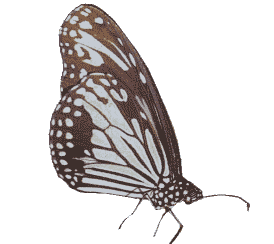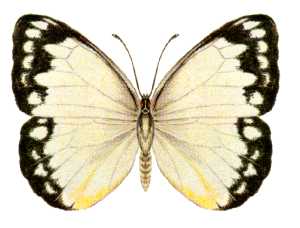
Parantica, commonly called tigers, is an Old World genus of butterflies in subfamily Danainae of family Nymphalidae. They are found in southeastern Asia, Indonesia, Papua-New Guinea, and the Philippines. Many of these species are endemic to islands and considered endangered, vulnerable, or threatened according to the IUCN Red List. For other butterflies called tigers see the genus Danaus.

Jamides, commonly called ceruleans, is a genus of butterflies in the family Lycaenidae. The species of this genus are found in the Indomalayan realm, the Palearctic realm and the Australasian realm.

Mycalesis, the bushbrowns, are a genus of brush-footed butterflies. They are common in the warm regions from Central Asia to Australia, and have a high diversity in South Asia and the Wallacea.

Anthene is a genus of butterflies in the family Lycaenidae, commonly called the ciliate blues or hairtails. The genus was erected by Edward Doubleday in 1847.

Candalides is a large genus of butterflies in the family Lycaenidae. The species of this genus are found in the Australasian realm.

Danis is a genus of butterflies in the family Lycaenidae. The species of this genus are found in the Australasian realm.

Hypochrysops is a genus of butterflies in the family Lycaenidae first described by Cajetan Felder and Rudolf Felder in 1860. This particular genus is exclusive to the Australian area with only a few species straying into Papua New Guinea.

Liptena is a genus of butterflies in the family Lycaenidae. Liptena is endemic to the Afrotropics.
Henley Grose-Smith (1833–1911) was an English entomologist who specialised in Lepidoptera.

Cepora perimale, the caper gull, is a butterfly in the family Pieridae. It is found on Norfolk Island and in New South Wales, the Northern Territory, Queensland, Victoria, Western Australia, Fiji, Irian Jaya, Maluku, Sulawesi, New Caledonia, Papua New Guinea, the Solomon Islands and Vanuatu.

Hypocysta is a genus of butterflies in the family Nymphalidae. The genus contains 12 species.
Candalides lamia is a species of butterfly of the family Lycaenidae. It was described by Henley Grose-Smith in 1897. It is found in Papua New Guinea on Fergusson Island and Goodenough Island.
Candalides silicea is a species of butterfly of the family Lycaenidae. It was described by Henley Grose-Smith in 1894. It is found in the Schouten Islands and Mefor Island in New Guinea.
Candalides coerulea is a species of butterfly of the family Lycaenidae. It was described by Röber in 1886. It is found on the Aru Islands and in West Irian.

Danis danis, the large green-banded blue, is a species of butterfly in the family Lycaenidae. This species can be found in the Australia and New Guinea. Larva feed on Alphitonia excelsa.

Jamides allectus is a butterfly in the family Lycaenidae. It was described by Henley Grose-Smith in 1894. It is endemic to New Guinea.










